Evaluating CSR's Impact: A Study on Tesco's Performance
VerifiedAdded on 2023/01/12
|14
|2423
|66
Report
AI Summary
This report critically evaluates the effects of Corporate Social Responsibility (CSR) on Tesco plc's performance. It begins with an introduction outlining the aim and objectives, followed by a literature review defining CSR and its impact on organizational performance, employee motivation, and associated challenges. The research employs a qualitative methodology using an interpretivism philosophy, descriptive research design, and an inductive approach. Data collection involved primary and secondary sources, with a sample of 20 Tesco managers analyzed using thematic analysis. Findings reveal that employees are familiar with CSR, the company is implementing CSR practices, and these practices positively influence employee proficiency. Key CSR practices include reducing carbon footprint, minimizing plastic use, and organizing charitable events. The major challenge identified is the high investment required for effective CSR implementation. Recommendations include board meetings to communicate CSR policies, and continuous research to adapt CSR strategies to societal changes. The conclusion emphasizes the importance of CSR for managing competitive positioning and goodwill, highlighting the research methods employed and the significance of data analysis. The report provides a comprehensive overview of CSR practices, challenges, and recommendations for Tesco, contributing to a better understanding of the relationship between CSR and organizational success.
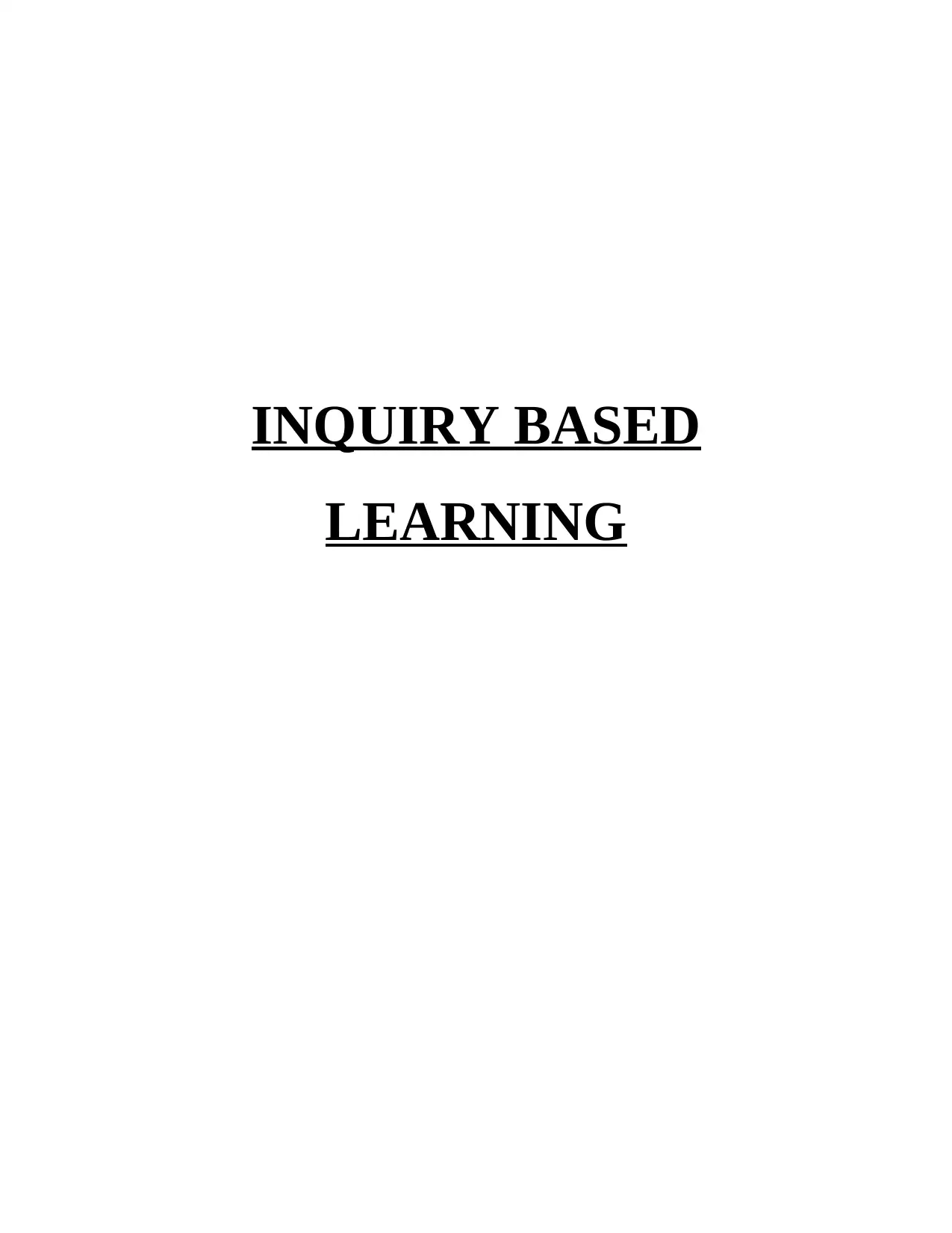
INQUIRY BASED
LEARNING
LEARNING
Paraphrase This Document
Need a fresh take? Get an instant paraphrase of this document with our AI Paraphraser
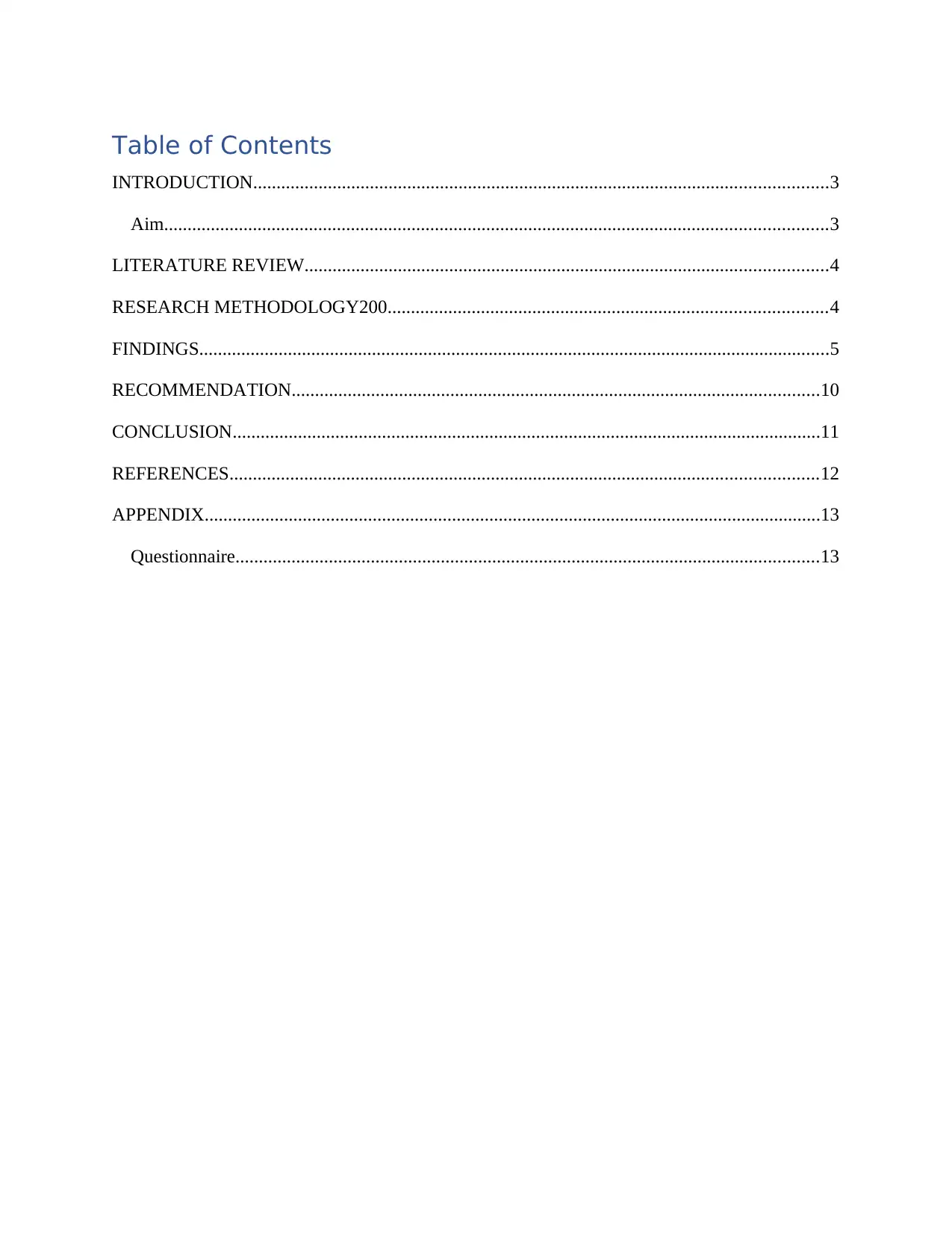
Table of Contents
INTRODUCTION...........................................................................................................................3
Aim..............................................................................................................................................3
LITERATURE REVIEW................................................................................................................4
RESEARCH METHODOLOGY200..............................................................................................4
FINDINGS.......................................................................................................................................5
RECOMMENDATION.................................................................................................................10
CONCLUSION..............................................................................................................................11
REFERENCES..............................................................................................................................12
APPENDIX....................................................................................................................................13
Questionnaire.............................................................................................................................13
INTRODUCTION...........................................................................................................................3
Aim..............................................................................................................................................3
LITERATURE REVIEW................................................................................................................4
RESEARCH METHODOLOGY200..............................................................................................4
FINDINGS.......................................................................................................................................5
RECOMMENDATION.................................................................................................................10
CONCLUSION..............................................................................................................................11
REFERENCES..............................................................................................................................12
APPENDIX....................................................................................................................................13
Questionnaire.............................................................................................................................13
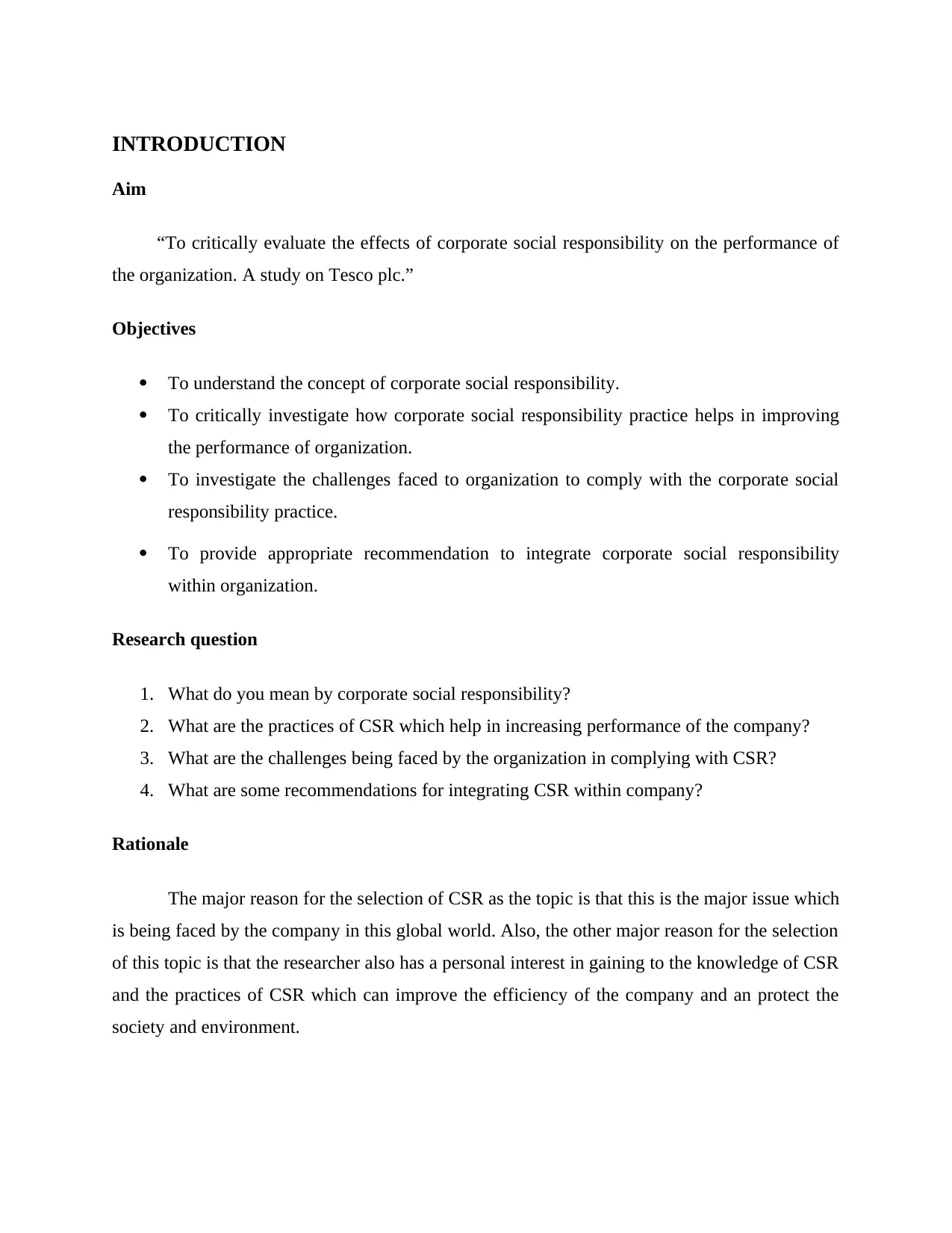
INTRODUCTION
Aim
“To critically evaluate the effects of corporate social responsibility on the performance of
the organization. A study on Tesco plc.”
Objectives
To understand the concept of corporate social responsibility.
To critically investigate how corporate social responsibility practice helps in improving
the performance of organization.
To investigate the challenges faced to organization to comply with the corporate social
responsibility practice.
To provide appropriate recommendation to integrate corporate social responsibility
within organization.
Research question
1. What do you mean by corporate social responsibility?
2. What are the practices of CSR which help in increasing performance of the company?
3. What are the challenges being faced by the organization in complying with CSR?
4. What are some recommendations for integrating CSR within company?
Rationale
The major reason for the selection of CSR as the topic is that this is the major issue which
is being faced by the company in this global world. Also, the other major reason for the selection
of this topic is that the researcher also has a personal interest in gaining to the knowledge of CSR
and the practices of CSR which can improve the efficiency of the company and an protect the
society and environment.
Aim
“To critically evaluate the effects of corporate social responsibility on the performance of
the organization. A study on Tesco plc.”
Objectives
To understand the concept of corporate social responsibility.
To critically investigate how corporate social responsibility practice helps in improving
the performance of organization.
To investigate the challenges faced to organization to comply with the corporate social
responsibility practice.
To provide appropriate recommendation to integrate corporate social responsibility
within organization.
Research question
1. What do you mean by corporate social responsibility?
2. What are the practices of CSR which help in increasing performance of the company?
3. What are the challenges being faced by the organization in complying with CSR?
4. What are some recommendations for integrating CSR within company?
Rationale
The major reason for the selection of CSR as the topic is that this is the major issue which
is being faced by the company in this global world. Also, the other major reason for the selection
of this topic is that the researcher also has a personal interest in gaining to the knowledge of CSR
and the practices of CSR which can improve the efficiency of the company and an protect the
society and environment.
⊘ This is a preview!⊘
Do you want full access?
Subscribe today to unlock all pages.

Trusted by 1+ million students worldwide
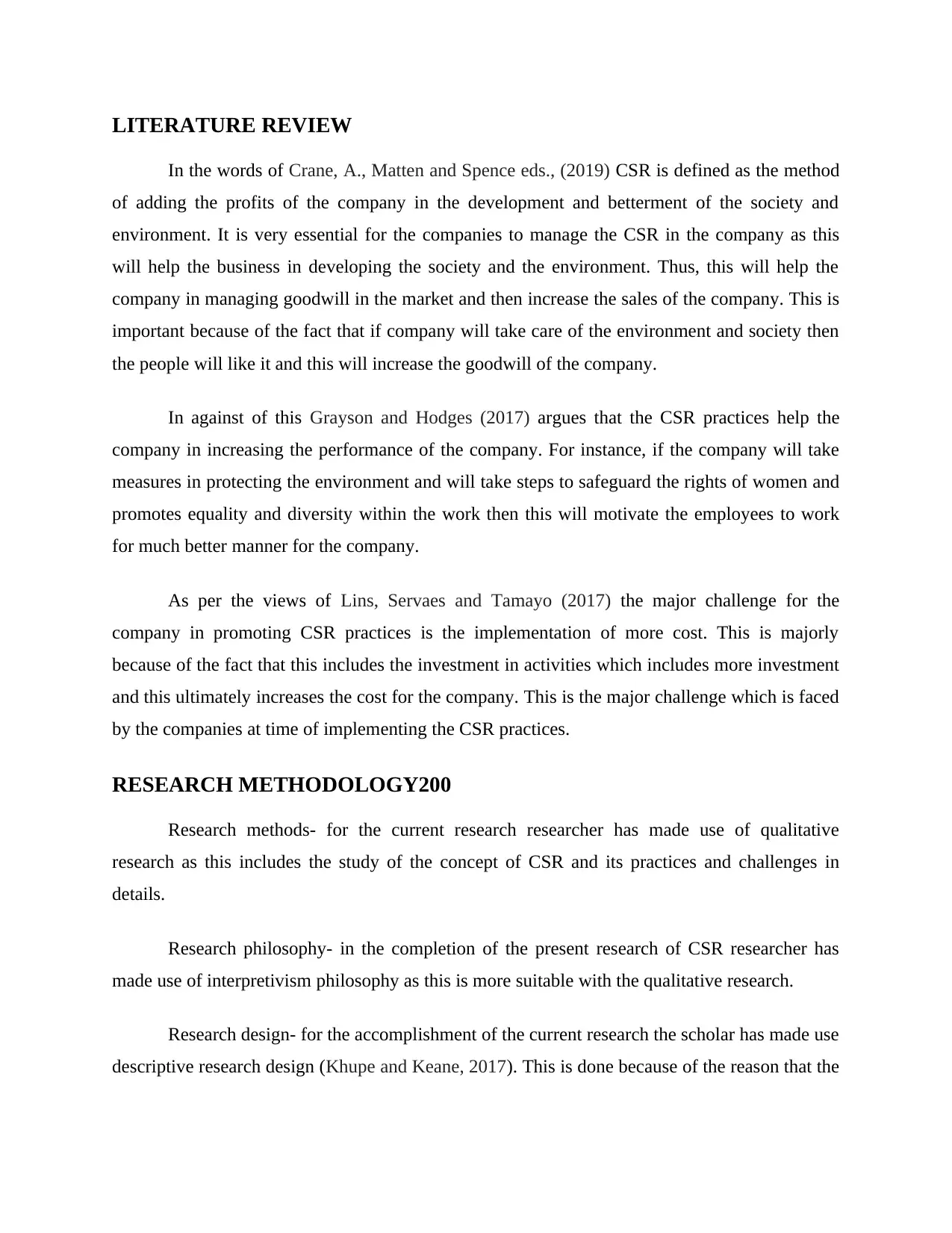
LITERATURE REVIEW
In the words of Crane, A., Matten and Spence eds., (2019) CSR is defined as the method
of adding the profits of the company in the development and betterment of the society and
environment. It is very essential for the companies to manage the CSR in the company as this
will help the business in developing the society and the environment. Thus, this will help the
company in managing goodwill in the market and then increase the sales of the company. This is
important because of the fact that if company will take care of the environment and society then
the people will like it and this will increase the goodwill of the company.
In against of this Grayson and Hodges (2017) argues that the CSR practices help the
company in increasing the performance of the company. For instance, if the company will take
measures in protecting the environment and will take steps to safeguard the rights of women and
promotes equality and diversity within the work then this will motivate the employees to work
for much better manner for the company.
As per the views of Lins, Servaes and Tamayo (2017) the major challenge for the
company in promoting CSR practices is the implementation of more cost. This is majorly
because of the fact that this includes the investment in activities which includes more investment
and this ultimately increases the cost for the company. This is the major challenge which is faced
by the companies at time of implementing the CSR practices.
RESEARCH METHODOLOGY200
Research methods- for the current research researcher has made use of qualitative
research as this includes the study of the concept of CSR and its practices and challenges in
details.
Research philosophy- in the completion of the present research of CSR researcher has
made use of interpretivism philosophy as this is more suitable with the qualitative research.
Research design- for the accomplishment of the current research the scholar has made use
descriptive research design (Khupe and Keane, 2017). This is done because of the reason that the
In the words of Crane, A., Matten and Spence eds., (2019) CSR is defined as the method
of adding the profits of the company in the development and betterment of the society and
environment. It is very essential for the companies to manage the CSR in the company as this
will help the business in developing the society and the environment. Thus, this will help the
company in managing goodwill in the market and then increase the sales of the company. This is
important because of the fact that if company will take care of the environment and society then
the people will like it and this will increase the goodwill of the company.
In against of this Grayson and Hodges (2017) argues that the CSR practices help the
company in increasing the performance of the company. For instance, if the company will take
measures in protecting the environment and will take steps to safeguard the rights of women and
promotes equality and diversity within the work then this will motivate the employees to work
for much better manner for the company.
As per the views of Lins, Servaes and Tamayo (2017) the major challenge for the
company in promoting CSR practices is the implementation of more cost. This is majorly
because of the fact that this includes the investment in activities which includes more investment
and this ultimately increases the cost for the company. This is the major challenge which is faced
by the companies at time of implementing the CSR practices.
RESEARCH METHODOLOGY200
Research methods- for the current research researcher has made use of qualitative
research as this includes the study of the concept of CSR and its practices and challenges in
details.
Research philosophy- in the completion of the present research of CSR researcher has
made use of interpretivism philosophy as this is more suitable with the qualitative research.
Research design- for the accomplishment of the current research the scholar has made use
descriptive research design (Khupe and Keane, 2017). This is done because of the reason that the
Paraphrase This Document
Need a fresh take? Get an instant paraphrase of this document with our AI Paraphraser
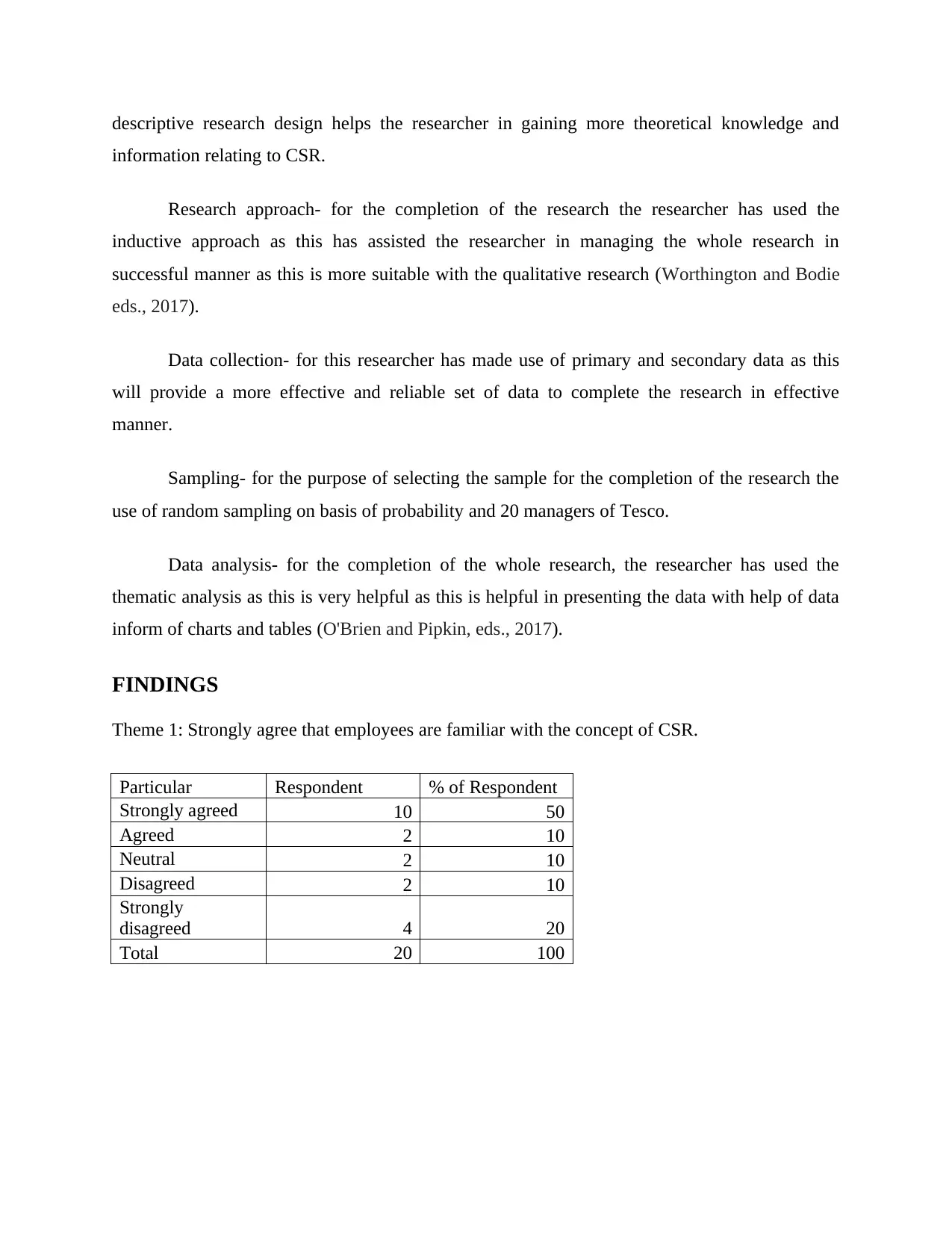
descriptive research design helps the researcher in gaining more theoretical knowledge and
information relating to CSR.
Research approach- for the completion of the research the researcher has used the
inductive approach as this has assisted the researcher in managing the whole research in
successful manner as this is more suitable with the qualitative research (Worthington and Bodie
eds., 2017).
Data collection- for this researcher has made use of primary and secondary data as this
will provide a more effective and reliable set of data to complete the research in effective
manner.
Sampling- for the purpose of selecting the sample for the completion of the research the
use of random sampling on basis of probability and 20 managers of Tesco.
Data analysis- for the completion of the whole research, the researcher has used the
thematic analysis as this is very helpful as this is helpful in presenting the data with help of data
inform of charts and tables (O'Brien and Pipkin, eds., 2017).
FINDINGS
Theme 1: Strongly agree that employees are familiar with the concept of CSR.
Particular Respondent % of Respondent
Strongly agreed 10 50
Agreed 2 10
Neutral 2 10
Disagreed 2 10
Strongly
disagreed 4 20
Total 20 100
information relating to CSR.
Research approach- for the completion of the research the researcher has used the
inductive approach as this has assisted the researcher in managing the whole research in
successful manner as this is more suitable with the qualitative research (Worthington and Bodie
eds., 2017).
Data collection- for this researcher has made use of primary and secondary data as this
will provide a more effective and reliable set of data to complete the research in effective
manner.
Sampling- for the purpose of selecting the sample for the completion of the research the
use of random sampling on basis of probability and 20 managers of Tesco.
Data analysis- for the completion of the whole research, the researcher has used the
thematic analysis as this is very helpful as this is helpful in presenting the data with help of data
inform of charts and tables (O'Brien and Pipkin, eds., 2017).
FINDINGS
Theme 1: Strongly agree that employees are familiar with the concept of CSR.
Particular Respondent % of Respondent
Strongly agreed 10 50
Agreed 2 10
Neutral 2 10
Disagreed 2 10
Strongly
disagreed 4 20
Total 20 100
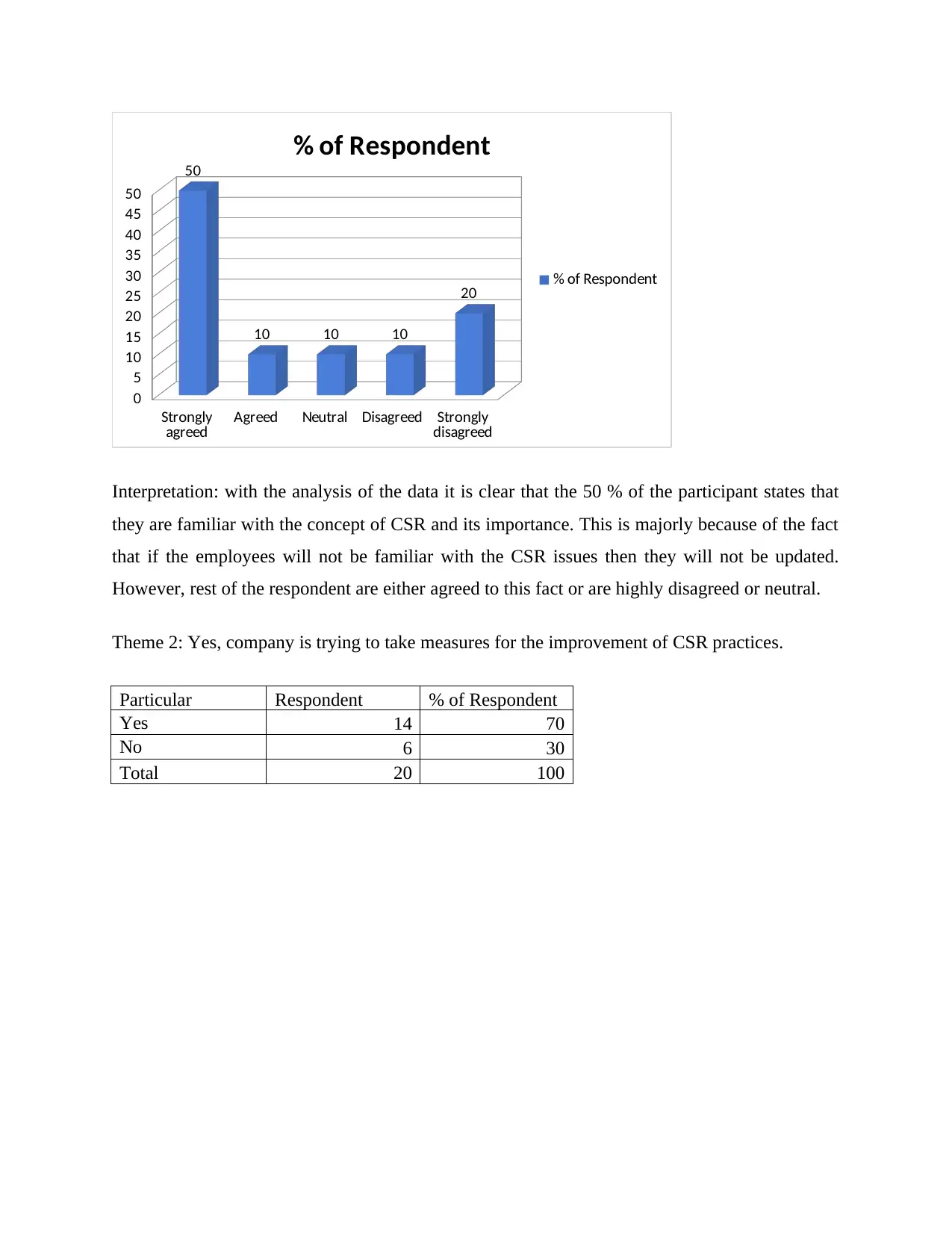
Strongly
agreed Agreed Neutral Disagreed Strongly
disagreed
0
5
10
15
20
25
30
35
40
45
50
50
10 10 10
20
% of Respondent
% of Respondent
Interpretation: with the analysis of the data it is clear that the 50 % of the participant states that
they are familiar with the concept of CSR and its importance. This is majorly because of the fact
that if the employees will not be familiar with the CSR issues then they will not be updated.
However, rest of the respondent are either agreed to this fact or are highly disagreed or neutral.
Theme 2: Yes, company is trying to take measures for the improvement of CSR practices.
Particular Respondent % of Respondent
Yes 14 70
No 6 30
Total 20 100
agreed Agreed Neutral Disagreed Strongly
disagreed
0
5
10
15
20
25
30
35
40
45
50
50
10 10 10
20
% of Respondent
% of Respondent
Interpretation: with the analysis of the data it is clear that the 50 % of the participant states that
they are familiar with the concept of CSR and its importance. This is majorly because of the fact
that if the employees will not be familiar with the CSR issues then they will not be updated.
However, rest of the respondent are either agreed to this fact or are highly disagreed or neutral.
Theme 2: Yes, company is trying to take measures for the improvement of CSR practices.
Particular Respondent % of Respondent
Yes 14 70
No 6 30
Total 20 100
⊘ This is a preview!⊘
Do you want full access?
Subscribe today to unlock all pages.

Trusted by 1+ million students worldwide
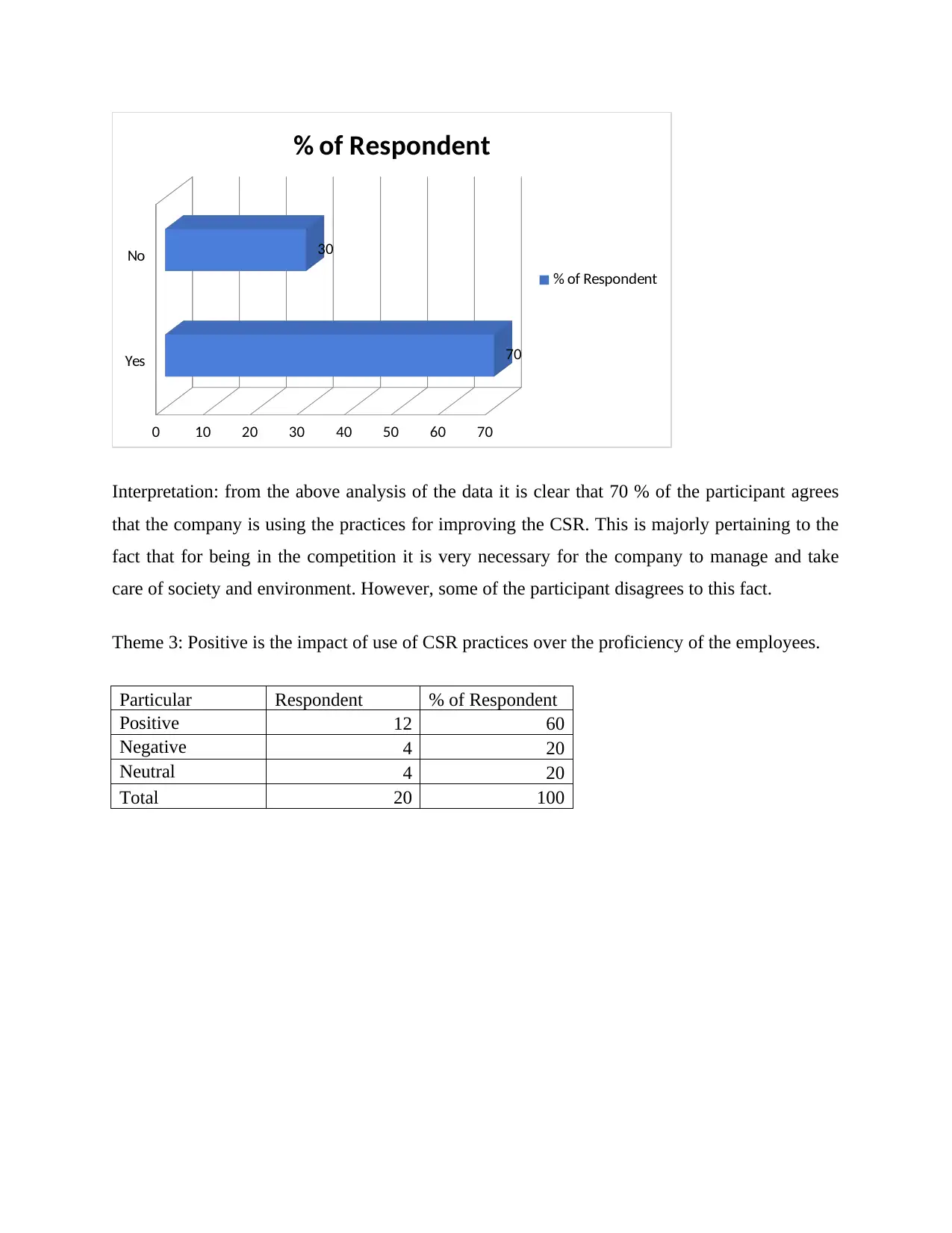
Yes
No
0 10 20 30 40 50 60 70
70
30
% of Respondent
% of Respondent
Interpretation: from the above analysis of the data it is clear that 70 % of the participant agrees
that the company is using the practices for improving the CSR. This is majorly pertaining to the
fact that for being in the competition it is very necessary for the company to manage and take
care of society and environment. However, some of the participant disagrees to this fact.
Theme 3: Positive is the impact of use of CSR practices over the proficiency of the employees.
Particular Respondent % of Respondent
Positive 12 60
Negative 4 20
Neutral 4 20
Total 20 100
No
0 10 20 30 40 50 60 70
70
30
% of Respondent
% of Respondent
Interpretation: from the above analysis of the data it is clear that 70 % of the participant agrees
that the company is using the practices for improving the CSR. This is majorly pertaining to the
fact that for being in the competition it is very necessary for the company to manage and take
care of society and environment. However, some of the participant disagrees to this fact.
Theme 3: Positive is the impact of use of CSR practices over the proficiency of the employees.
Particular Respondent % of Respondent
Positive 12 60
Negative 4 20
Neutral 4 20
Total 20 100
Paraphrase This Document
Need a fresh take? Get an instant paraphrase of this document with our AI Paraphraser
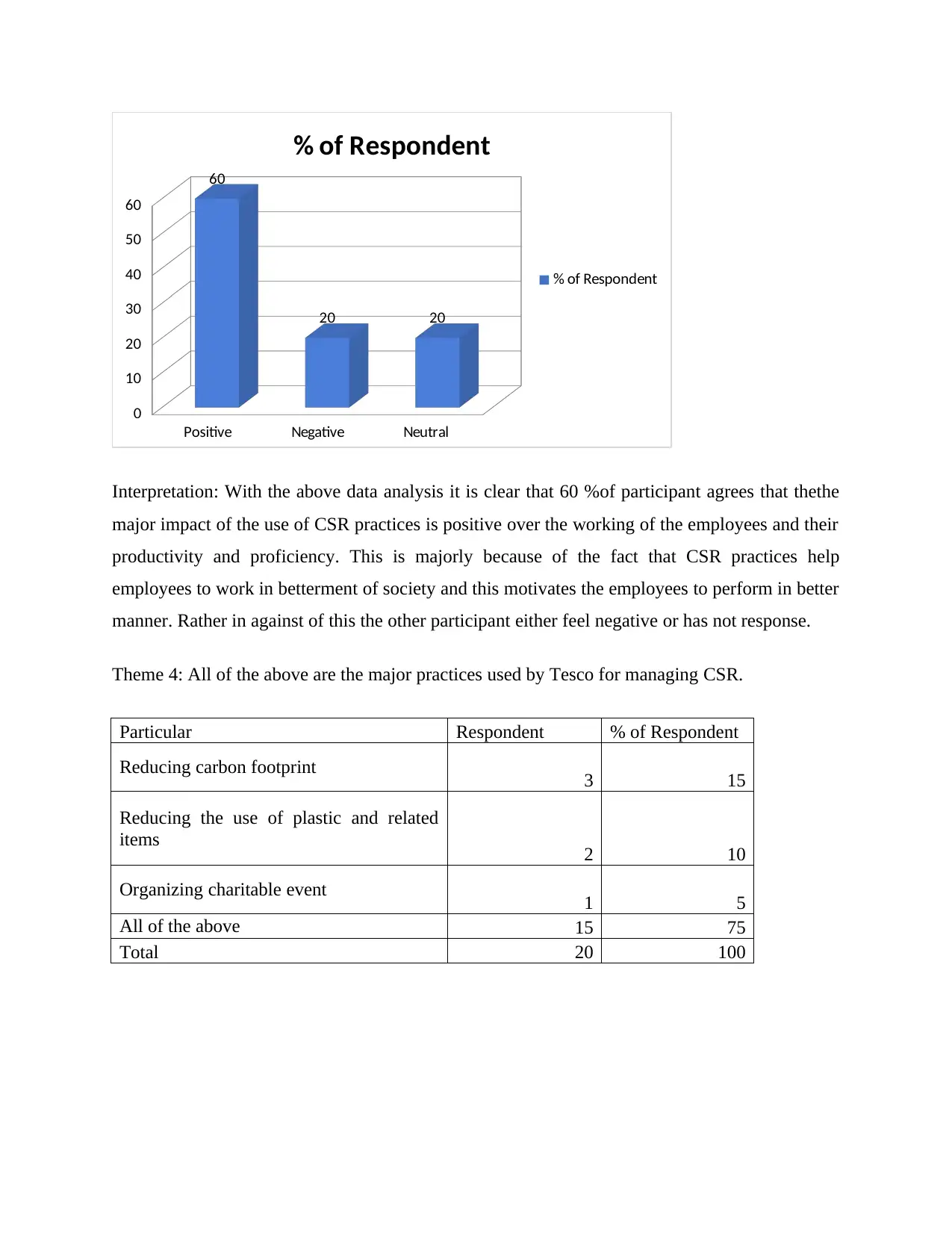
Positive Negative Neutral
0
10
20
30
40
50
60
60
20 20
% of Respondent
% of Respondent
Interpretation: With the above data analysis it is clear that 60 %of participant agrees that thethe
major impact of the use of CSR practices is positive over the working of the employees and their
productivity and proficiency. This is majorly because of the fact that CSR practices help
employees to work in betterment of society and this motivates the employees to perform in better
manner. Rather in against of this the other participant either feel negative or has not response.
Theme 4: All of the above are the major practices used by Tesco for managing CSR.
Particular Respondent % of Respondent
Reducing carbon footprint 3 15
Reducing the use of plastic and related
items 2 10
Organizing charitable event 1 5
All of the above 15 75
Total 20 100
0
10
20
30
40
50
60
60
20 20
% of Respondent
% of Respondent
Interpretation: With the above data analysis it is clear that 60 %of participant agrees that thethe
major impact of the use of CSR practices is positive over the working of the employees and their
productivity and proficiency. This is majorly because of the fact that CSR practices help
employees to work in betterment of society and this motivates the employees to perform in better
manner. Rather in against of this the other participant either feel negative or has not response.
Theme 4: All of the above are the major practices used by Tesco for managing CSR.
Particular Respondent % of Respondent
Reducing carbon footprint 3 15
Reducing the use of plastic and related
items 2 10
Organizing charitable event 1 5
All of the above 15 75
Total 20 100
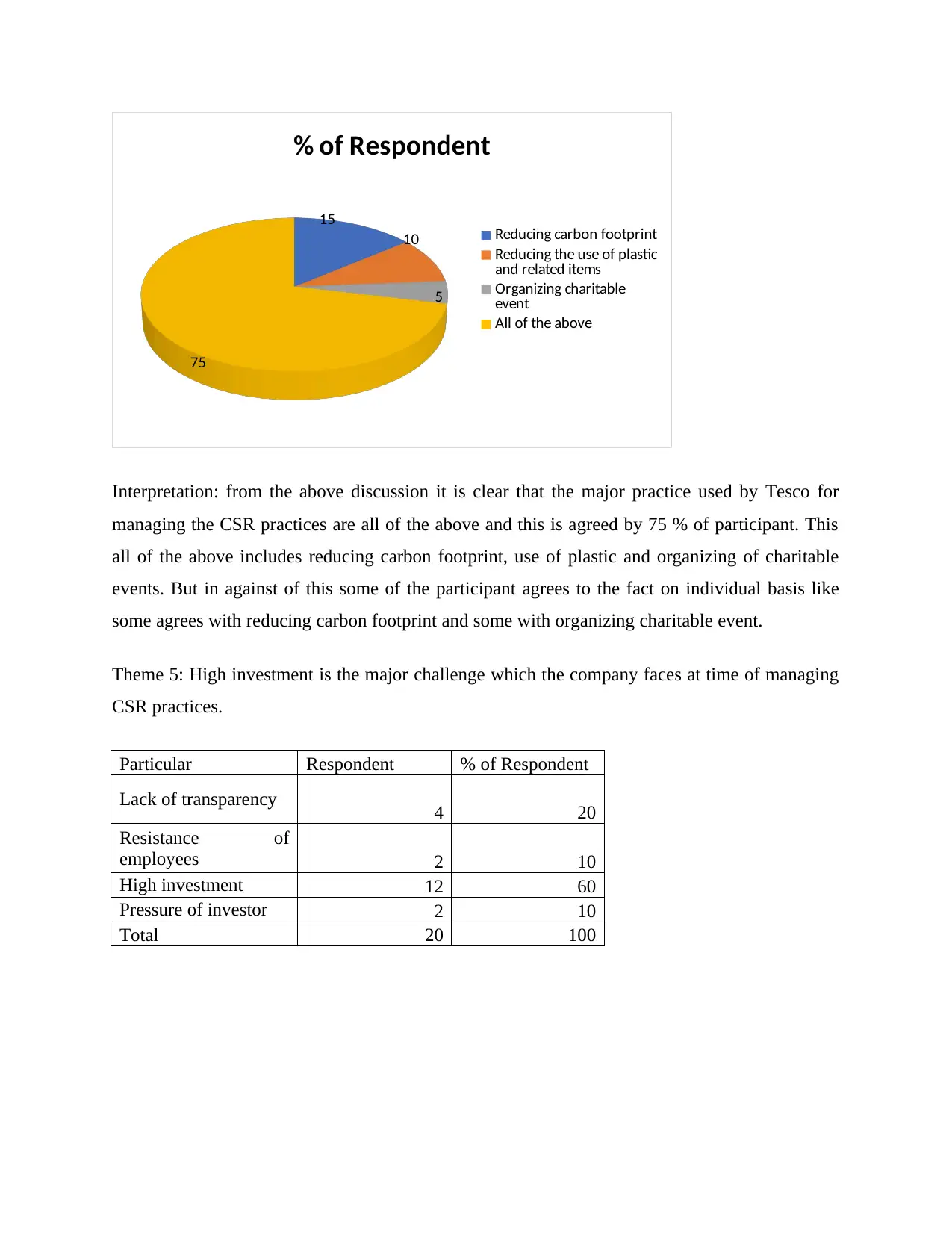
15
10
5
75
% of Respondent
Reducing carbon footprint
Reducing the use of plastic
and related items
Organizing charitable
event
All of the above
Interpretation: from the above discussion it is clear that the major practice used by Tesco for
managing the CSR practices are all of the above and this is agreed by 75 % of participant. This
all of the above includes reducing carbon footprint, use of plastic and organizing of charitable
events. But in against of this some of the participant agrees to the fact on individual basis like
some agrees with reducing carbon footprint and some with organizing charitable event.
Theme 5: High investment is the major challenge which the company faces at time of managing
CSR practices.
Particular Respondent % of Respondent
Lack of transparency 4 20
Resistance of
employees 2 10
High investment 12 60
Pressure of investor 2 10
Total 20 100
10
5
75
% of Respondent
Reducing carbon footprint
Reducing the use of plastic
and related items
Organizing charitable
event
All of the above
Interpretation: from the above discussion it is clear that the major practice used by Tesco for
managing the CSR practices are all of the above and this is agreed by 75 % of participant. This
all of the above includes reducing carbon footprint, use of plastic and organizing of charitable
events. But in against of this some of the participant agrees to the fact on individual basis like
some agrees with reducing carbon footprint and some with organizing charitable event.
Theme 5: High investment is the major challenge which the company faces at time of managing
CSR practices.
Particular Respondent % of Respondent
Lack of transparency 4 20
Resistance of
employees 2 10
High investment 12 60
Pressure of investor 2 10
Total 20 100
⊘ This is a preview!⊘
Do you want full access?
Subscribe today to unlock all pages.

Trusted by 1+ million students worldwide
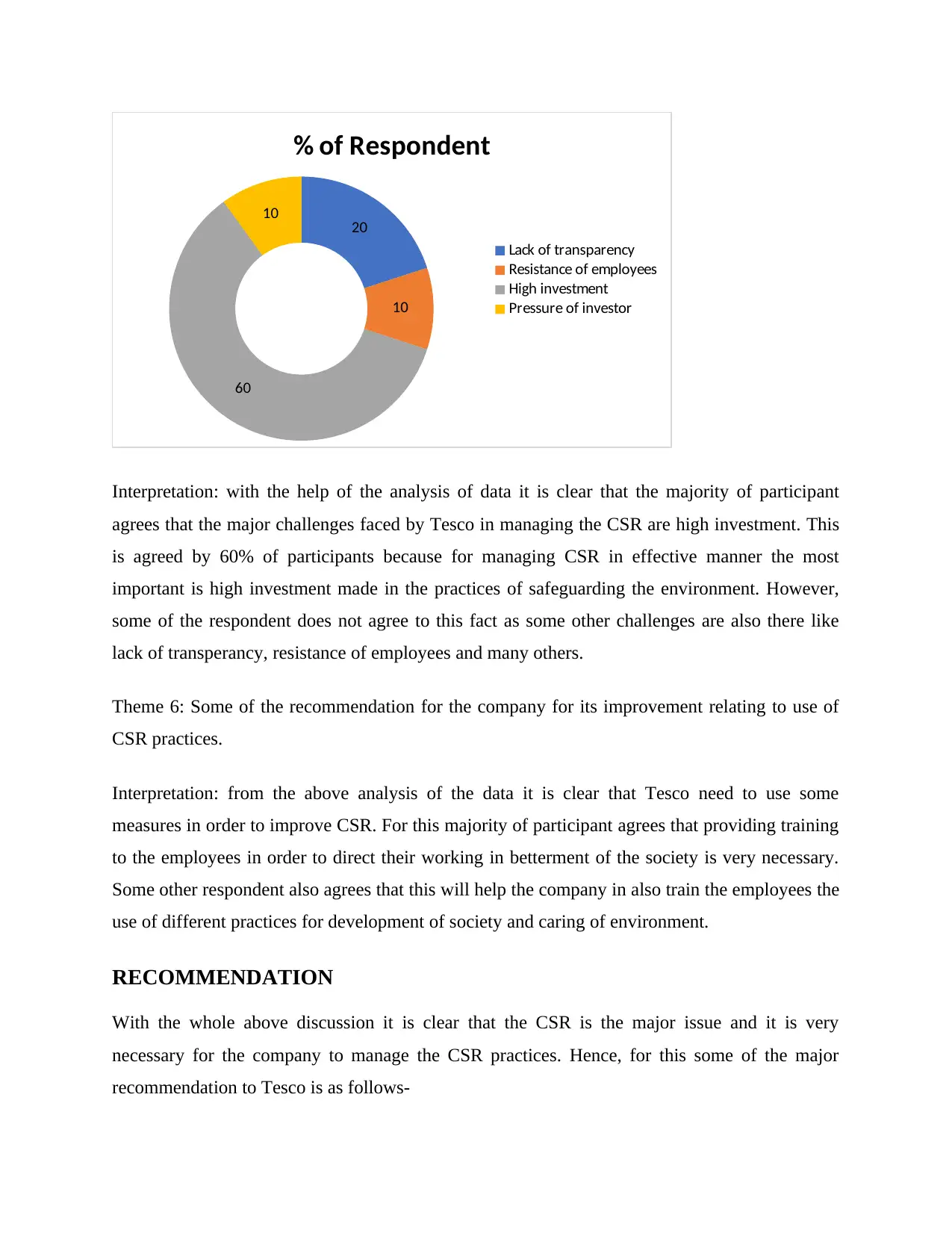
20
10
60
10
% of Respondent
Lack of transparency
Resistance of employees
High investment
Pressure of investor
Interpretation: with the help of the analysis of data it is clear that the majority of participant
agrees that the major challenges faced by Tesco in managing the CSR are high investment. This
is agreed by 60% of participants because for managing CSR in effective manner the most
important is high investment made in the practices of safeguarding the environment. However,
some of the respondent does not agree to this fact as some other challenges are also there like
lack of transperancy, resistance of employees and many others.
Theme 6: Some of the recommendation for the company for its improvement relating to use of
CSR practices.
Interpretation: from the above analysis of the data it is clear that Tesco need to use some
measures in order to improve CSR. For this majority of participant agrees that providing training
to the employees in order to direct their working in betterment of the society is very necessary.
Some other respondent also agrees that this will help the company in also train the employees the
use of different practices for development of society and caring of environment.
RECOMMENDATION
With the whole above discussion it is clear that the CSR is the major issue and it is very
necessary for the company to manage the CSR practices. Hence, for this some of the major
recommendation to Tesco is as follows-
10
60
10
% of Respondent
Lack of transparency
Resistance of employees
High investment
Pressure of investor
Interpretation: with the help of the analysis of data it is clear that the majority of participant
agrees that the major challenges faced by Tesco in managing the CSR are high investment. This
is agreed by 60% of participants because for managing CSR in effective manner the most
important is high investment made in the practices of safeguarding the environment. However,
some of the respondent does not agree to this fact as some other challenges are also there like
lack of transperancy, resistance of employees and many others.
Theme 6: Some of the recommendation for the company for its improvement relating to use of
CSR practices.
Interpretation: from the above analysis of the data it is clear that Tesco need to use some
measures in order to improve CSR. For this majority of participant agrees that providing training
to the employees in order to direct their working in betterment of the society is very necessary.
Some other respondent also agrees that this will help the company in also train the employees the
use of different practices for development of society and caring of environment.
RECOMMENDATION
With the whole above discussion it is clear that the CSR is the major issue and it is very
necessary for the company to manage the CSR practices. Hence, for this some of the major
recommendation to Tesco is as follows-
Paraphrase This Document
Need a fresh take? Get an instant paraphrase of this document with our AI Paraphraser
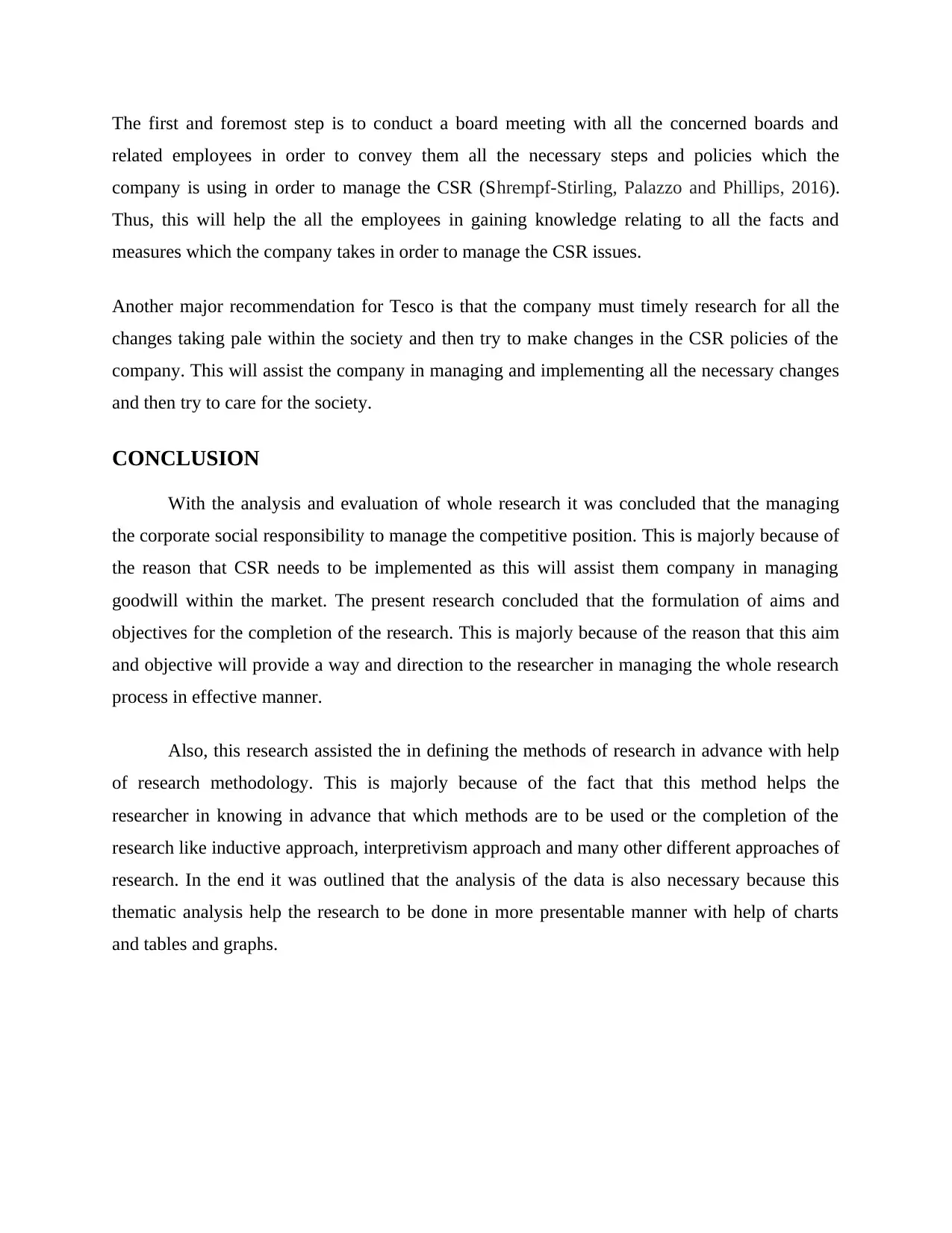
The first and foremost step is to conduct a board meeting with all the concerned boards and
related employees in order to convey them all the necessary steps and policies which the
company is using in order to manage the CSR (Shrempf-Stirling, Palazzo and Phillips, 2016).
Thus, this will help the all the employees in gaining knowledge relating to all the facts and
measures which the company takes in order to manage the CSR issues.
Another major recommendation for Tesco is that the company must timely research for all the
changes taking pale within the society and then try to make changes in the CSR policies of the
company. This will assist the company in managing and implementing all the necessary changes
and then try to care for the society.
CONCLUSION
With the analysis and evaluation of whole research it was concluded that the managing
the corporate social responsibility to manage the competitive position. This is majorly because of
the reason that CSR needs to be implemented as this will assist them company in managing
goodwill within the market. The present research concluded that the formulation of aims and
objectives for the completion of the research. This is majorly because of the reason that this aim
and objective will provide a way and direction to the researcher in managing the whole research
process in effective manner.
Also, this research assisted the in defining the methods of research in advance with help
of research methodology. This is majorly because of the fact that this method helps the
researcher in knowing in advance that which methods are to be used or the completion of the
research like inductive approach, interpretivism approach and many other different approaches of
research. In the end it was outlined that the analysis of the data is also necessary because this
thematic analysis help the research to be done in more presentable manner with help of charts
and tables and graphs.
related employees in order to convey them all the necessary steps and policies which the
company is using in order to manage the CSR (Shrempf-Stirling, Palazzo and Phillips, 2016).
Thus, this will help the all the employees in gaining knowledge relating to all the facts and
measures which the company takes in order to manage the CSR issues.
Another major recommendation for Tesco is that the company must timely research for all the
changes taking pale within the society and then try to make changes in the CSR policies of the
company. This will assist the company in managing and implementing all the necessary changes
and then try to care for the society.
CONCLUSION
With the analysis and evaluation of whole research it was concluded that the managing
the corporate social responsibility to manage the competitive position. This is majorly because of
the reason that CSR needs to be implemented as this will assist them company in managing
goodwill within the market. The present research concluded that the formulation of aims and
objectives for the completion of the research. This is majorly because of the reason that this aim
and objective will provide a way and direction to the researcher in managing the whole research
process in effective manner.
Also, this research assisted the in defining the methods of research in advance with help
of research methodology. This is majorly because of the fact that this method helps the
researcher in knowing in advance that which methods are to be used or the completion of the
research like inductive approach, interpretivism approach and many other different approaches of
research. In the end it was outlined that the analysis of the data is also necessary because this
thematic analysis help the research to be done in more presentable manner with help of charts
and tables and graphs.
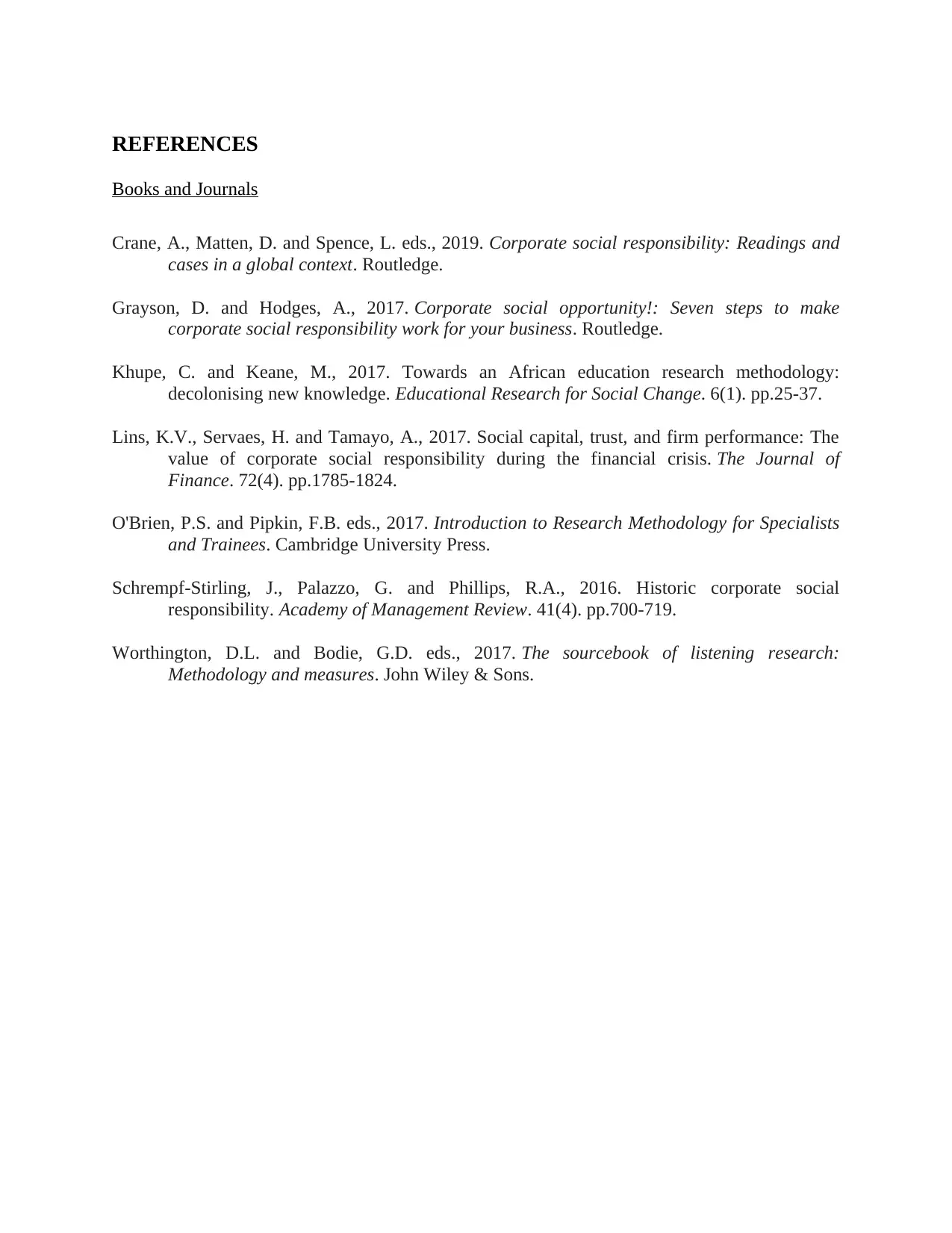
REFERENCES
Books and Journals
Crane, A., Matten, D. and Spence, L. eds., 2019. Corporate social responsibility: Readings and
cases in a global context. Routledge.
Grayson, D. and Hodges, A., 2017. Corporate social opportunity!: Seven steps to make
corporate social responsibility work for your business. Routledge.
Khupe, C. and Keane, M., 2017. Towards an African education research methodology:
decolonising new knowledge. Educational Research for Social Change. 6(1). pp.25-37.
Lins, K.V., Servaes, H. and Tamayo, A., 2017. Social capital, trust, and firm performance: The
value of corporate social responsibility during the financial crisis. The Journal of
Finance. 72(4). pp.1785-1824.
O'Brien, P.S. and Pipkin, F.B. eds., 2017. Introduction to Research Methodology for Specialists
and Trainees. Cambridge University Press.
Schrempf-Stirling, J., Palazzo, G. and Phillips, R.A., 2016. Historic corporate social
responsibility. Academy of Management Review. 41(4). pp.700-719.
Worthington, D.L. and Bodie, G.D. eds., 2017. The sourcebook of listening research:
Methodology and measures. John Wiley & Sons.
Books and Journals
Crane, A., Matten, D. and Spence, L. eds., 2019. Corporate social responsibility: Readings and
cases in a global context. Routledge.
Grayson, D. and Hodges, A., 2017. Corporate social opportunity!: Seven steps to make
corporate social responsibility work for your business. Routledge.
Khupe, C. and Keane, M., 2017. Towards an African education research methodology:
decolonising new knowledge. Educational Research for Social Change. 6(1). pp.25-37.
Lins, K.V., Servaes, H. and Tamayo, A., 2017. Social capital, trust, and firm performance: The
value of corporate social responsibility during the financial crisis. The Journal of
Finance. 72(4). pp.1785-1824.
O'Brien, P.S. and Pipkin, F.B. eds., 2017. Introduction to Research Methodology for Specialists
and Trainees. Cambridge University Press.
Schrempf-Stirling, J., Palazzo, G. and Phillips, R.A., 2016. Historic corporate social
responsibility. Academy of Management Review. 41(4). pp.700-719.
Worthington, D.L. and Bodie, G.D. eds., 2017. The sourcebook of listening research:
Methodology and measures. John Wiley & Sons.
⊘ This is a preview!⊘
Do you want full access?
Subscribe today to unlock all pages.

Trusted by 1+ million students worldwide
1 out of 14
Related Documents
Your All-in-One AI-Powered Toolkit for Academic Success.
+13062052269
info@desklib.com
Available 24*7 on WhatsApp / Email
![[object Object]](/_next/static/media/star-bottom.7253800d.svg)
Unlock your academic potential
Copyright © 2020–2025 A2Z Services. All Rights Reserved. Developed and managed by ZUCOL.



